2025年中考英语复习 第12节 句子-课件
文档属性
| 名称 | 2025年中考英语复习 第12节 句子-课件 |
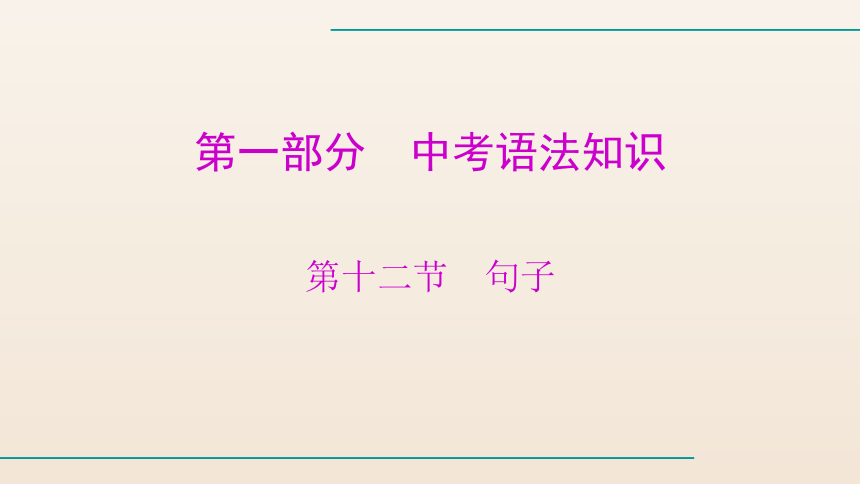
|
|
| 格式 | pptx | ||
| 文件大小 | 185.2KB | ||
| 资源类型 | 试卷 | ||
| 版本资源 | 通用版 | ||
| 科目 | 英语 | ||
| 更新时间 | 2025-01-21 00:00:00 | ||
图片预览

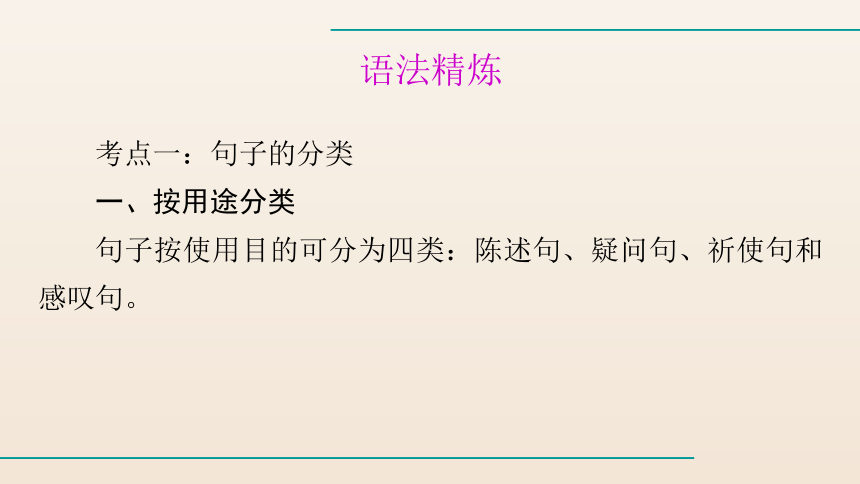
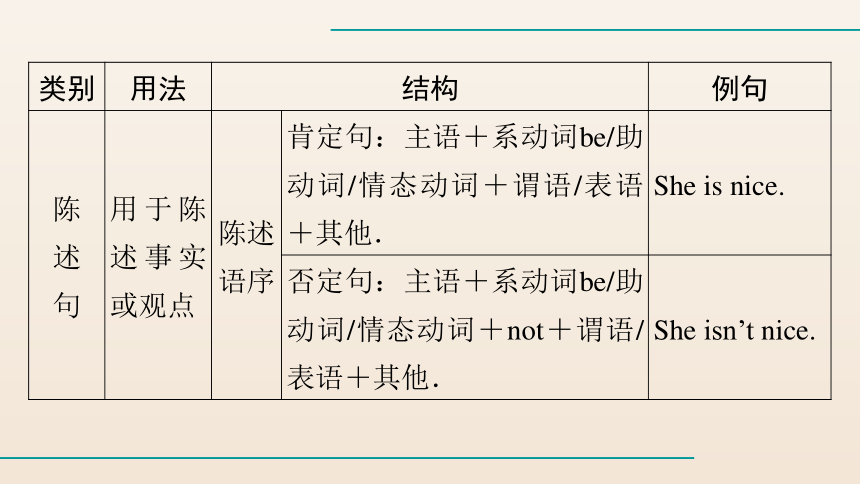
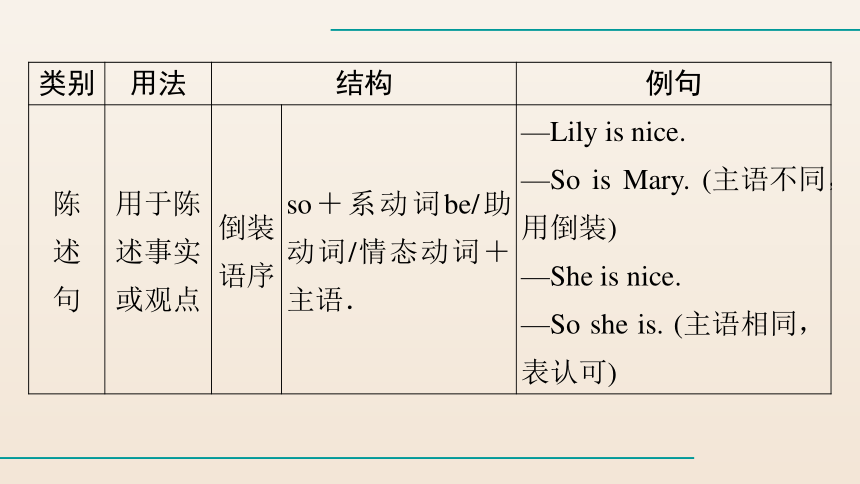

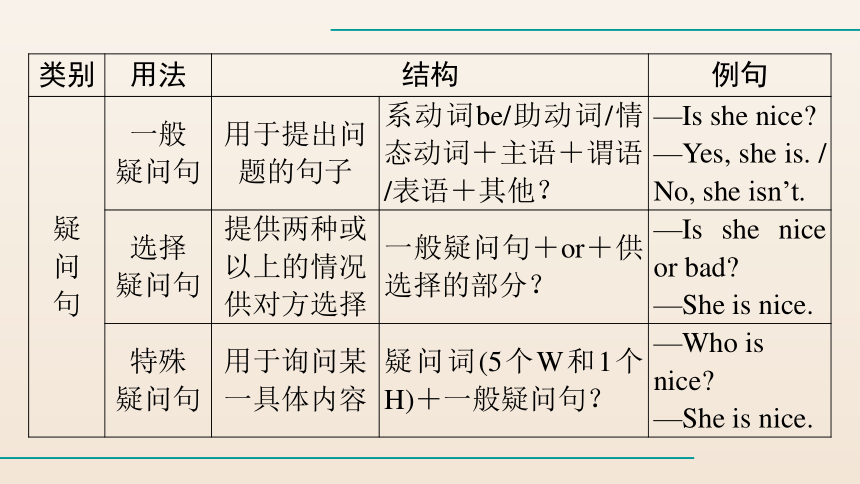
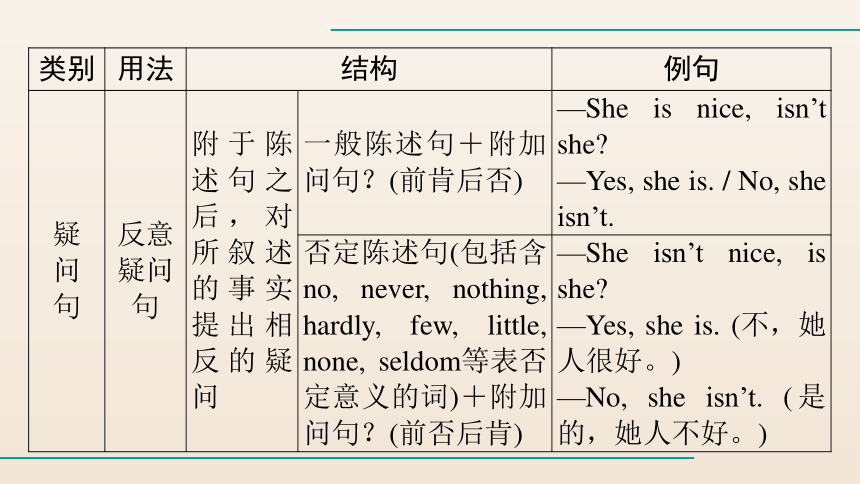
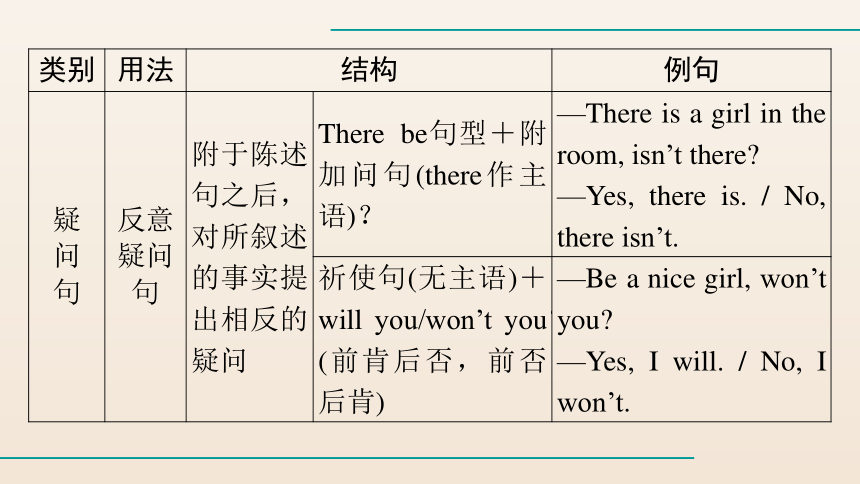
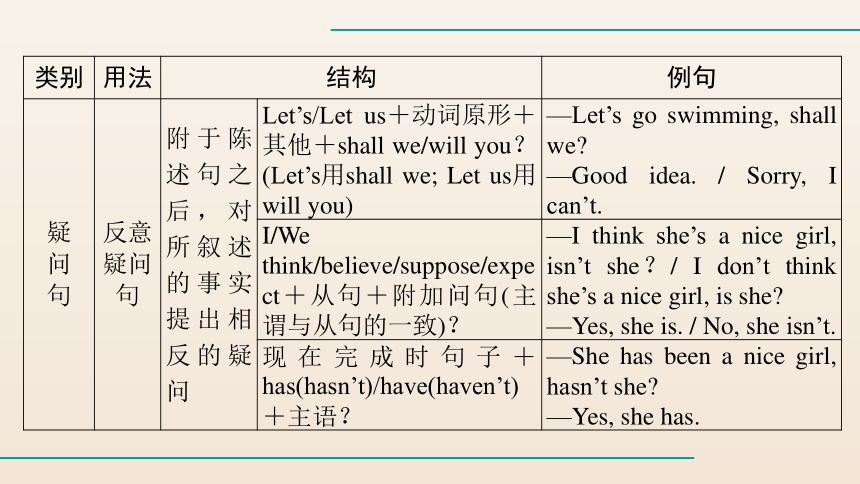
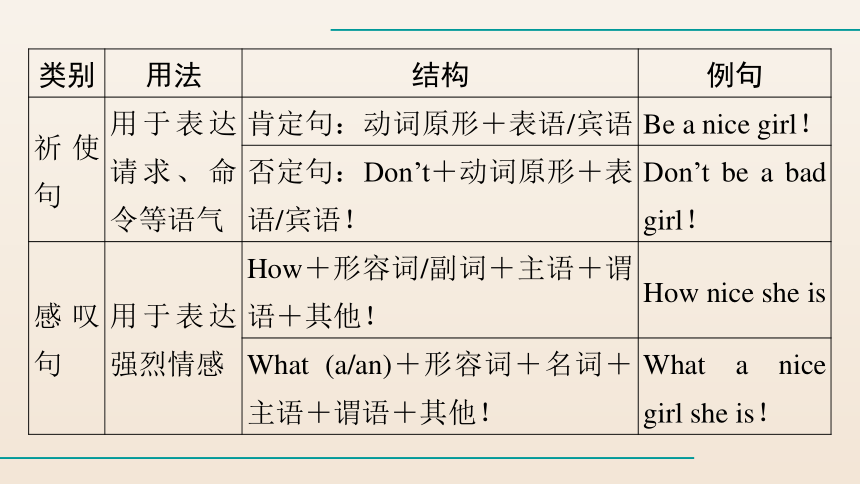
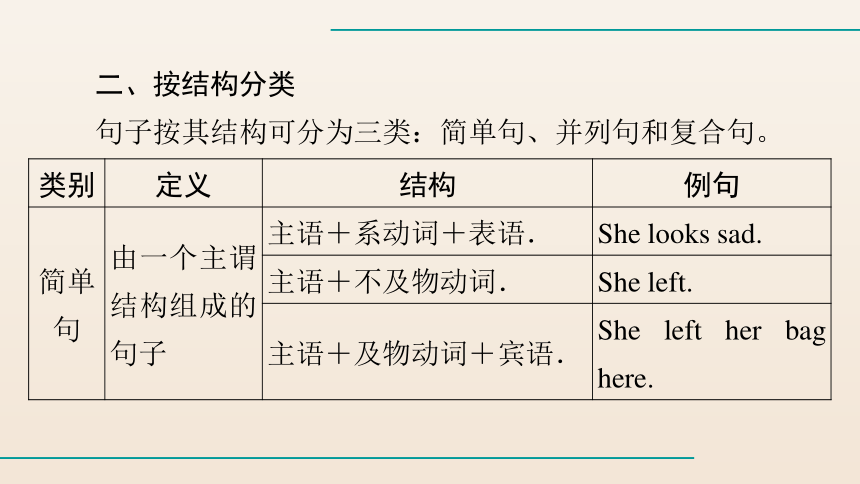
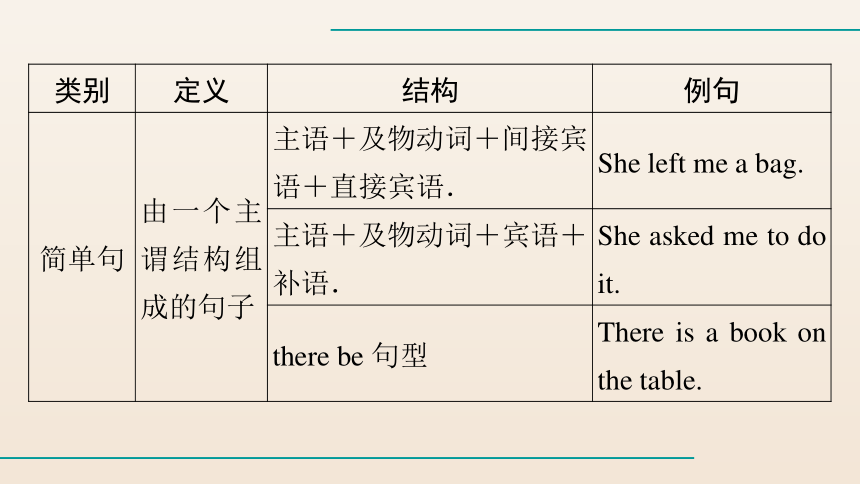
文档简介
(共61张PPT)
第一部分 中考语法知识
第十二节 句子
考点一:句子的分类
一、按用途分类
句子按使用目的可分为四类:陈述句、疑问句、祈使句和感叹句。
语法精炼
类别 用法 结构 例句
陈 述 句 用于陈述事实或观点 陈述语序 肯定句:主语+系动词be/助动词/情态动词+谓语/表语+其他. She is nice.
否定句:主语+系动词be/助动词/情态动词+not+谓语/表语+其他. She isn’t nice.
类别 用法 结构 例句
陈 述 句 用于陈述事实或观点 倒装语序 so+系动词be/助动词/情态动词+主语. —Lily is nice.
—So is Mary. (主语不同,用倒装)
—She is nice.
—So she is. (主语相同,表认可)
类别 用法 结构 例句
陈 述 句 用于陈述事实或观点 倒装语序 neither/nor+系动词be/助动词/情态动词+主语. She isn’t bad, neither is he.
Here/There+谓语+主语(名词). Here are some apples for you.
类别 用法 结构 例句
疑 问 句 一般 疑问句 用于提出问题的句子 系动词be/助动词/情态动词+主语+谓语/表语+其他? —Is she nice
—Yes, she is. / No, she isn’t.
选择 疑问句 提供两种或以上的情况供对方选择 一般疑问句+or+供选择的部分? —Is she nice or bad
—She is nice.
特殊 疑问句 用于询问某一具体内容 疑问词(5个W和1个H)+一般疑问句? —Who is nice
—She is nice.
类别 用法 结构 例句
疑 问 句 反意 疑问句 附于陈述句之后,对所叙述的事实提出相反的疑问 一般陈述句+附加问句?(前肯后否) —She is nice, isn’t she
—Yes, she is. / No, she isn’t.
否定陈述句(包括含no, never, nothing, hardly, few, little, none, seldom等表否定意义的词)+附加问句?(前否后肯) —She isn’t nice, is she
—Yes, she is. (不,她人很好。)
—No, she isn’t. (是的,她人不好。)
类别 用法 结构 例句
疑 问 句 反意 疑问句 附于陈述句之后,对所叙述的事实提出相反的疑问 There be句型+附加问句(there作主语)? —There is a girl in the room, isn’t there
—Yes, there is. / No, there isn’t.
祈使句(无主语)+will you/won’t you?(前肯后否,前否后肯) —Be a nice girl, won’t you
—Yes, I will. / No, I won’t.
类别 用法 结构 例句
疑 问 句 反意 疑问句 附于陈述句之后,对所叙述的事实提出相反的疑问 Let’s/Let us+动词原形+其他+shall we/will you?(Let’s用shall we; Let us用will you) —Let’s go swimming, shall we
—Good idea. / Sorry, I can’t.
I/We think/believe/suppose/expect+从句+附加问句(主谓与从句的一致)? —I think she’s a nice girl, isn’t she?/ I don’t think she’s a nice girl, is she
—Yes, she is. / No, she isn’t.
现在完成时句子+has(hasn’t)/have(haven’t)+主语? —She has been a nice girl, hasn’t she
—Yes, she has.
类别 用法 结构 例句
祈使句 用于表达请求、命令等语气 肯定句:动词原形+表语/宾语! Be a nice girl!
否定句:Don’t+动词原形+表语/宾语! Don’t be a bad girl!
感叹句 用于表达强烈情感 How+形容词/副词+主语+谓语+其他! How nice she is!
What (a/an)+形容词+名词+主语+谓语+其他! What a nice girl she is!
二、按结构分类
句子按其结构可分为三类:简单句、并列句和复合句。
类别 定义 结构 例句
简单句 由一个主谓结构组成的句子 主语+系动词+表语. She looks sad.
主语+不及物动词. She left.
主语+及物动词+宾语. She left her bag here.
类别 定义 结构 例句
简单句 由一个主谓结构组成的句子 主语+及物动词+间接宾语+直接宾语. She left me a bag.
主语+及物动词+宾语+补语. She asked me to do it.
there be 句型 There is a book on the table.
类别 定义 结构 例句
并 列 句 由两个或两个以上分句组成的句子 简单句+并列连词(and/not only… but also…/both…and…/as well as)+简单句 She left and I stayed.
简单句+转折连词(but/however/ while/yet)+简单句 She left, but I stayed.
简单句+选择连词(or/either… or…/neither…nor…)+简单句 She left, or I left.
简单句+因果连词(so/for)+简单句 She left, so I stayed.
类别 定义 结构 例句
复 合 句 宾语从句 连接词(when/where/who/what/ whether/if/why/how/that)+主语+谓语 She said that she would leave.
定语从句 关系词(who/whom/whose/ when/where/which/that)+主语+谓语 She left for Beijing which is the capital of China.
类别 定义 结构 例句
复合句 状语从句 时间状语从句:连接词(when/ while/as/before/after/until/as soon as)+主语+谓语 She left as soon as I arrived.
条件状语从句:连接词(if/unless)+主语+谓语 She won’t leave unless I arrive.
原因状语从句:连接词(because/since/as)+主语+谓语 She left because it was a sad place.
类别 定义 结构 例句
复 合 句 状语从句 让步状语从句:连接词(though/ although)+主语+谓语 She left though everyone asked her to stay.
目的状语从句:连接词(so that/in order that)+主语+谓语 She left so that she could have a new life.
结果状语从句:连接词(so… that/such…that)+主语+谓语 She left so early that she caught the first bus.
比较状语从句:连接词(than/ as…as…)+主语+谓语 She left earlier than I did.
【针对练习】
( )1.(2024 淮安,6)—______ do you walk your dog every day, Bob
—For about half an hour.
A.How much B.How long
C.How often D.How many
B
( )2.(2024 兴安盟,8)—Let’s go out for dinner tonight, ______
—Sorry, but I cannot make it today.
A.can we B.will you
C.can you D.shall we
D
( )3.(2024 宿迁,10)— ______ fine weather! It’s a good match for going on a picnic.
—Exactly. I simply can’t wait!
A.How B.What
C.How a D.What a
B
( )4.(2024 长春,9) ______ helpful the speech is! It tells us to use the Internet safely.
A.What B.What a
C.How D.What an
( )5.— ______ I take photos here
—Sorry, you can’t. It’s not allowed in the museum.
A.Must B.Need
C.Can D.Will
C
C
考点二:宾语从句、状语从句、定语从句
一、宾语从句
在主从复合句中充当宾语的句子叫作宾语从句。
(一)引导词
宾语从句引导词 例句
陈述句充当宾语从句时,用that引导,that无词义,在口语或非正式文体中常省略 My teacher said (that) I was a good boy.
宾语从句引导词 例句
当一般疑问句充当宾语从句时,用if或whether引导,意为“是否” I don’t know if/whether Jim is a good student.
如果宾语从句原来是特殊疑问句,只需用原来的疑问词引导 Can you tell me what she is doing?
(二)宾语从句的语序必须是陈述语序
类别 引导词 语序 例句
陈述句 that 不发生变化 I think (that) we can be good friends.
一般疑问句 if/whether 改为陈述语序 I can’t remember if/whether I posted the letter.
特殊 疑问句 wh-疑问词 (不作主语时) 改为陈述语序 He asked what our English teacher looked like.
(三) 宾语从句与主句的时态要相互呼应
时态 例句
如果主句的时态是现在时,宾语从句可根据实际情况灵活运用各种时态 I wonder if you have ever been to Harbin.
如果主句的时态是一般过去时,宾语从句只能用相应的过去时态 He told me that he would go to Beijing.
从句陈述的是一般真理、客观事实、自然现象、名言时,宾语从句仍用现在时 Dad told us that it is better to do than to say.
【针对练习】
( )1.(2024 广州,4)They were so surprised at ______ they saw.
A.what B.that
C.how D.which
A
( )2.(2024 河北,39)To know ______ the mountain top looks like, you need to reach it.
A.what B.when
C.where D.which
( )3.(2024 陕西A卷,10)This explains ______ good helpers to people.
A.why do dogs B.why dogs do
C.why are dogs D.why dogs are
A
D
( )4.(2024 北京,12)—Tim, do you know ______ the art festival
—Sure! Next Friday.
A.when did we hold B.when we held
C.when will we hold D.when we will hold
D
( )5.(2024 兴安盟,13)—Excuse me, could you tell me ______
—Sorry, I have no idea.
A.that we will have to put off the meeting
B.if we would put off the meeting
C.whether we will put off the meeting
D.where we will put off the meeting
C
二、状语从句
在主从复合句中,用来修饰主句中的动词、形容词或副词等而充当状语的从句叫作状语从句。
状语从句分时间、地点、原因、条件、目的、结果、让步、比较和方式等几种类型。
序号 类别 从属连词 例句
1 时间状语从句 when, while, as, before, after, since, till/until, as soon as等 When we were dancing, a beggar came in.
They were washing clothes while we were reading magazines.
序号 类别 从属连词 例句
2 地点状语从句 where, wherever John found his visa where he lost it.
We can go wherever we would like to go in the summer holiday.
3 原因状语从句 because, since, as, for I didn’t go abroad with her because I couldn’t afford it.
序号 类别 从属连词 例句
4 条件状语从句 if, unless, as long as You’ll pass the exam if you study hard.
You’ll be late unless you hurry.
5 目的状语从句 so that, in order that, in case He put away the knife so that his child couldn’t reach it.
Take your umbrella in case it rains.
序号 类别 从属连词 例句
6 结果状语从句 so…that…,such…that… She spoke so fast that nobody could catch what she was saying.
7 让步状语从句 though, although, even if/though等 Though she’s very young, she knows quite a lot.
序号 类别 从属连词 例句
8 比较状语从句 as…as…,not as/so…as…,than We were as lucky as they were.
9 方式状语从句 as, as if/though They look as if they know each other.
注意:状语从句可位于主句之前,用逗号与其隔开,也可位于主句之后。
【针对练习】
( )1.(2024 临夏州,17)Tom didn’t go to bed ______ his mother came back last night.
A.until B.if
C.because D.unless
A
( )2.(2024 无锡,4)Everyone loves my dog Coffee, ______ he often makes a mess at home.
A.until B.since
C.though D.whether
( )3.(2024 常州,6)Practice is very important. You will forget the new words ______ you often use them.
A.when B.unless
C.if D.until
C
B
( )4.(2024连云港,3)Our school life is more interesting now ______ we can enjoy ourselves in different clubs.
A.because B.whether
C.unless D.although
( )5.(2024扬州,12) ______ you are too tired to do all the things on your To-Do list, try a To-Don’t list.
A.If B.Until
C.Although D.Unless
A
A
三、定语从句
在主从复合句中充当定语修饰某一名词或代词的从句叫作定语从句。
(一)引导定语从句的关系词及其功能
关系词 先行词 从句成分 例句 备注
关系 代词 who 人 主语、宾语 Do you know the man who is talking with your father? whom, which和that在从句中作宾语时,常可以省略。 但介词提前时,关系代词不能省略,也不可以用that
关系词 先行词 从句成分 例句 备注
关系 代词 that 人/物 主语、宾语 A plane is a machine that can fly. whom, which和that在从句中作宾语时,常可以省略。 但介词提前时,关系代词不能省略,也不可以用that
which 物 主语、宾语 The book which I gave you was worth $10. 关系词 先行词 从句成分 例句 备注
关系 副词 as 人/物 主语、宾语 He is such a person as is respected by all of us. as作宾语一般不省略
when 时间 名词 时间状语 I will never forget the day when we met there. 可用on which替代
关系词 先行词 从句成分 例句 备注
关系 副词 where 地点名词 地点状语 This is the house where I was born. 可用in which替代
why reason 原因状语 I can’t imagine the reason why he turned down my offer. 可用for which替代
(二)that与which, who和whom的用法区别
情形 用法说明 例句
只用that的情况 先行词为all, everything, anything, nothing, little, much等不定代词时 He told me everything that he knows.
先行词被all, any, every, each, much, little, no, some, few等修饰时 All the books that you offered have been given out.
先行词被形容词最高级和序数词修饰时 This is the best film that I have ever seen.
情形 用法说明 例句
只用that的情况 先行词既指人又指物时 We talked about the persons and things that we met during the trip.
先行词被the only, the very修饰时 He is the only man that I want to see.
句中已经有who或which, 为了避免重复时 Who is the man that is making a speech?
情形 用法说明 例句
只用which, who, whom的情况 在非限制性定语从句中,只能用which指代物,用who/whom指人 He has a son, who has gone abroad for further study.
在由“介词+关系代词”引导的定语从句中,只能用which指物,whom指人 I like the person to whom the teacher is talking.
先行词本身是that时,关系词用which;先行词为those, one或 he时,关系词多用who Those who respect others are usually respected by others, too.
【针对练习】
( )1.(2024 兴安盟,14)In difficult times, there are always national heroes ______ step up and bring people hope.
A.whom B.who
C.which D.whose
B
( )2.(2024 长春,8)As a science lover, I hope I can invent a bike ______ can fly in the sky.
A.where B.when
C.which D.who
( )3.Parents are the people ______ we can talk with when we have some difficulties at any time.
A.what B.whom
C.which D.why
C
B
( )4.The museum ______ we are going to is the place ______ my grandpa used to work many years ago.
A.where; where B.where; which
C.which; where D.that; which
C
( )5.Beijing is one of the most educational cities ______ I have ever visited. I was so surprised at the Forbidden City when I visited it last year.
A.why B.whom
C.that D.which
C
一、单项选择
( )1.______ beautifully little Simon dances in front of the camera!
A.What B.What a
C.How D.How a
C
( )2.—The report is so difficult for your cousin.
—Yes, I am wondering ______ he can finish it by himself.
A.whether B.where
C.that D.why
( )3.If you don’t get a satisfactory result, ______ not to get too angry.
A.try B.trying
C.to try D.to trying
A
A
( )4.I waited for 20 minutes ______ the bus arrived, and I got on it right away.
A.since B.until
C.while D.after
B
( )5.— ______ great fun it is to go hiking in this season!
—Yeah, you can’t imagine ______ interesting it is if you don’t experience it yourself.
A.What a; how B.What; how
C.How a; what D.How; what
B
( )6.—I’m planning a trip to Harbin this summer vacation. I wonder ______.
—Why not go online to get more information about it
A.where can I eat something special
B.if July is the best time to go there
C.that local people are very friendly to visitors.
D.when will the 9th Asian Winter Games be held in Harbin
B
( )7.—Dear friends, do you still remember ______ three years ago
—To realize our dream!
A.why you came here B.why did you come here
C.how you came here D.why you come here
A
( )8.—I don’t know ______ during the summer vacation. Do you have any advice
—How about visiting Beijing International Horticultural Expo(北京国际园艺博览会)
A.what should I do B.when should I go
C.what I should do D.when I should go
C
( )9.—Excuse me, where is the nearest hotel
—Just go down this street ______ you see a library. It’s across from it.
A.because B.until
C.unless D.though
B
( )10.—Do you know Abing
—Of course. He is a folk musician with lots of talent ______ was born in the city of Wuxi in 1893.
A.which B.who
C.whom D.whose
B
二、完成句子
1.______ Jane ______________ Miss Wu’s suggestions, she ______ ______ a meaningful holiday.
如果简采纳吴老师的建议,她的假期会过得很有意义。
2._______ ____ ____ ______ _______ for us to make our contributions.
有一个我们做贡献的好机会。
If
takes/follows
will have
There is a good chance
3.Exams are only a way of __________ ______ we have learned.
考试只是检验我们所学知识的一种方式。
4.My friend asked me ________ ____ ________ this mobile phone.
我的朋友问我在哪里买的这款手机。
checking what
where I bought
5.After you finish your homework, you _______ _______ ______ you have learned more clearly.
当你做完作业后,你会更清楚地知道你学到了什么。
6.The many talks we have had and the advice you _______ _______ _____ help me grow.
我们的许多谈话和您给我的建议帮助我成长。
will know
what
have
given me
7.He _______ _______ how much his parents loved him ______ he grew up.
直到他长大了,他才意识到父母是多么爱他。
8.You can’t imagine _____ _______ ___ _____ when I heard the exciting news.
你无法想象当我听到这个令人兴奋的消息时是多么兴奋。
didn’t realize
until
how excited I was
第一部分 中考语法知识
第十二节 句子
考点一:句子的分类
一、按用途分类
句子按使用目的可分为四类:陈述句、疑问句、祈使句和感叹句。
语法精炼
类别 用法 结构 例句
陈 述 句 用于陈述事实或观点 陈述语序 肯定句:主语+系动词be/助动词/情态动词+谓语/表语+其他. She is nice.
否定句:主语+系动词be/助动词/情态动词+not+谓语/表语+其他. She isn’t nice.
类别 用法 结构 例句
陈 述 句 用于陈述事实或观点 倒装语序 so+系动词be/助动词/情态动词+主语. —Lily is nice.
—So is Mary. (主语不同,用倒装)
—She is nice.
—So she is. (主语相同,表认可)
类别 用法 结构 例句
陈 述 句 用于陈述事实或观点 倒装语序 neither/nor+系动词be/助动词/情态动词+主语. She isn’t bad, neither is he.
Here/There+谓语+主语(名词). Here are some apples for you.
类别 用法 结构 例句
疑 问 句 一般 疑问句 用于提出问题的句子 系动词be/助动词/情态动词+主语+谓语/表语+其他? —Is she nice
—Yes, she is. / No, she isn’t.
选择 疑问句 提供两种或以上的情况供对方选择 一般疑问句+or+供选择的部分? —Is she nice or bad
—She is nice.
特殊 疑问句 用于询问某一具体内容 疑问词(5个W和1个H)+一般疑问句? —Who is nice
—She is nice.
类别 用法 结构 例句
疑 问 句 反意 疑问句 附于陈述句之后,对所叙述的事实提出相反的疑问 一般陈述句+附加问句?(前肯后否) —She is nice, isn’t she
—Yes, she is. / No, she isn’t.
否定陈述句(包括含no, never, nothing, hardly, few, little, none, seldom等表否定意义的词)+附加问句?(前否后肯) —She isn’t nice, is she
—Yes, she is. (不,她人很好。)
—No, she isn’t. (是的,她人不好。)
类别 用法 结构 例句
疑 问 句 反意 疑问句 附于陈述句之后,对所叙述的事实提出相反的疑问 There be句型+附加问句(there作主语)? —There is a girl in the room, isn’t there
—Yes, there is. / No, there isn’t.
祈使句(无主语)+will you/won’t you?(前肯后否,前否后肯) —Be a nice girl, won’t you
—Yes, I will. / No, I won’t.
类别 用法 结构 例句
疑 问 句 反意 疑问句 附于陈述句之后,对所叙述的事实提出相反的疑问 Let’s/Let us+动词原形+其他+shall we/will you?(Let’s用shall we; Let us用will you) —Let’s go swimming, shall we
—Good idea. / Sorry, I can’t.
I/We think/believe/suppose/expect+从句+附加问句(主谓与从句的一致)? —I think she’s a nice girl, isn’t she?/ I don’t think she’s a nice girl, is she
—Yes, she is. / No, she isn’t.
现在完成时句子+has(hasn’t)/have(haven’t)+主语? —She has been a nice girl, hasn’t she
—Yes, she has.
类别 用法 结构 例句
祈使句 用于表达请求、命令等语气 肯定句:动词原形+表语/宾语! Be a nice girl!
否定句:Don’t+动词原形+表语/宾语! Don’t be a bad girl!
感叹句 用于表达强烈情感 How+形容词/副词+主语+谓语+其他! How nice she is!
What (a/an)+形容词+名词+主语+谓语+其他! What a nice girl she is!
二、按结构分类
句子按其结构可分为三类:简单句、并列句和复合句。
类别 定义 结构 例句
简单句 由一个主谓结构组成的句子 主语+系动词+表语. She looks sad.
主语+不及物动词. She left.
主语+及物动词+宾语. She left her bag here.
类别 定义 结构 例句
简单句 由一个主谓结构组成的句子 主语+及物动词+间接宾语+直接宾语. She left me a bag.
主语+及物动词+宾语+补语. She asked me to do it.
there be 句型 There is a book on the table.
类别 定义 结构 例句
并 列 句 由两个或两个以上分句组成的句子 简单句+并列连词(and/not only… but also…/both…and…/as well as)+简单句 She left and I stayed.
简单句+转折连词(but/however/ while/yet)+简单句 She left, but I stayed.
简单句+选择连词(or/either… or…/neither…nor…)+简单句 She left, or I left.
简单句+因果连词(so/for)+简单句 She left, so I stayed.
类别 定义 结构 例句
复 合 句 宾语从句 连接词(when/where/who/what/ whether/if/why/how/that)+主语+谓语 She said that she would leave.
定语从句 关系词(who/whom/whose/ when/where/which/that)+主语+谓语 She left for Beijing which is the capital of China.
类别 定义 结构 例句
复合句 状语从句 时间状语从句:连接词(when/ while/as/before/after/until/as soon as)+主语+谓语 She left as soon as I arrived.
条件状语从句:连接词(if/unless)+主语+谓语 She won’t leave unless I arrive.
原因状语从句:连接词(because/since/as)+主语+谓语 She left because it was a sad place.
类别 定义 结构 例句
复 合 句 状语从句 让步状语从句:连接词(though/ although)+主语+谓语 She left though everyone asked her to stay.
目的状语从句:连接词(so that/in order that)+主语+谓语 She left so that she could have a new life.
结果状语从句:连接词(so… that/such…that)+主语+谓语 She left so early that she caught the first bus.
比较状语从句:连接词(than/ as…as…)+主语+谓语 She left earlier than I did.
【针对练习】
( )1.(2024 淮安,6)—______ do you walk your dog every day, Bob
—For about half an hour.
A.How much B.How long
C.How often D.How many
B
( )2.(2024 兴安盟,8)—Let’s go out for dinner tonight, ______
—Sorry, but I cannot make it today.
A.can we B.will you
C.can you D.shall we
D
( )3.(2024 宿迁,10)— ______ fine weather! It’s a good match for going on a picnic.
—Exactly. I simply can’t wait!
A.How B.What
C.How a D.What a
B
( )4.(2024 长春,9) ______ helpful the speech is! It tells us to use the Internet safely.
A.What B.What a
C.How D.What an
( )5.— ______ I take photos here
—Sorry, you can’t. It’s not allowed in the museum.
A.Must B.Need
C.Can D.Will
C
C
考点二:宾语从句、状语从句、定语从句
一、宾语从句
在主从复合句中充当宾语的句子叫作宾语从句。
(一)引导词
宾语从句引导词 例句
陈述句充当宾语从句时,用that引导,that无词义,在口语或非正式文体中常省略 My teacher said (that) I was a good boy.
宾语从句引导词 例句
当一般疑问句充当宾语从句时,用if或whether引导,意为“是否” I don’t know if/whether Jim is a good student.
如果宾语从句原来是特殊疑问句,只需用原来的疑问词引导 Can you tell me what she is doing?
(二)宾语从句的语序必须是陈述语序
类别 引导词 语序 例句
陈述句 that 不发生变化 I think (that) we can be good friends.
一般疑问句 if/whether 改为陈述语序 I can’t remember if/whether I posted the letter.
特殊 疑问句 wh-疑问词 (不作主语时) 改为陈述语序 He asked what our English teacher looked like.
(三) 宾语从句与主句的时态要相互呼应
时态 例句
如果主句的时态是现在时,宾语从句可根据实际情况灵活运用各种时态 I wonder if you have ever been to Harbin.
如果主句的时态是一般过去时,宾语从句只能用相应的过去时态 He told me that he would go to Beijing.
从句陈述的是一般真理、客观事实、自然现象、名言时,宾语从句仍用现在时 Dad told us that it is better to do than to say.
【针对练习】
( )1.(2024 广州,4)They were so surprised at ______ they saw.
A.what B.that
C.how D.which
A
( )2.(2024 河北,39)To know ______ the mountain top looks like, you need to reach it.
A.what B.when
C.where D.which
( )3.(2024 陕西A卷,10)This explains ______ good helpers to people.
A.why do dogs B.why dogs do
C.why are dogs D.why dogs are
A
D
( )4.(2024 北京,12)—Tim, do you know ______ the art festival
—Sure! Next Friday.
A.when did we hold B.when we held
C.when will we hold D.when we will hold
D
( )5.(2024 兴安盟,13)—Excuse me, could you tell me ______
—Sorry, I have no idea.
A.that we will have to put off the meeting
B.if we would put off the meeting
C.whether we will put off the meeting
D.where we will put off the meeting
C
二、状语从句
在主从复合句中,用来修饰主句中的动词、形容词或副词等而充当状语的从句叫作状语从句。
状语从句分时间、地点、原因、条件、目的、结果、让步、比较和方式等几种类型。
序号 类别 从属连词 例句
1 时间状语从句 when, while, as, before, after, since, till/until, as soon as等 When we were dancing, a beggar came in.
They were washing clothes while we were reading magazines.
序号 类别 从属连词 例句
2 地点状语从句 where, wherever John found his visa where he lost it.
We can go wherever we would like to go in the summer holiday.
3 原因状语从句 because, since, as, for I didn’t go abroad with her because I couldn’t afford it.
序号 类别 从属连词 例句
4 条件状语从句 if, unless, as long as You’ll pass the exam if you study hard.
You’ll be late unless you hurry.
5 目的状语从句 so that, in order that, in case He put away the knife so that his child couldn’t reach it.
Take your umbrella in case it rains.
序号 类别 从属连词 例句
6 结果状语从句 so…that…,such…that… She spoke so fast that nobody could catch what she was saying.
7 让步状语从句 though, although, even if/though等 Though she’s very young, she knows quite a lot.
序号 类别 从属连词 例句
8 比较状语从句 as…as…,not as/so…as…,than We were as lucky as they were.
9 方式状语从句 as, as if/though They look as if they know each other.
注意:状语从句可位于主句之前,用逗号与其隔开,也可位于主句之后。
【针对练习】
( )1.(2024 临夏州,17)Tom didn’t go to bed ______ his mother came back last night.
A.until B.if
C.because D.unless
A
( )2.(2024 无锡,4)Everyone loves my dog Coffee, ______ he often makes a mess at home.
A.until B.since
C.though D.whether
( )3.(2024 常州,6)Practice is very important. You will forget the new words ______ you often use them.
A.when B.unless
C.if D.until
C
B
( )4.(2024连云港,3)Our school life is more interesting now ______ we can enjoy ourselves in different clubs.
A.because B.whether
C.unless D.although
( )5.(2024扬州,12) ______ you are too tired to do all the things on your To-Do list, try a To-Don’t list.
A.If B.Until
C.Although D.Unless
A
A
三、定语从句
在主从复合句中充当定语修饰某一名词或代词的从句叫作定语从句。
(一)引导定语从句的关系词及其功能
关系词 先行词 从句成分 例句 备注
关系 代词 who 人 主语、宾语 Do you know the man who is talking with your father? whom, which和that在从句中作宾语时,常可以省略。 但介词提前时,关系代词不能省略,也不可以用that
关系词 先行词 从句成分 例句 备注
关系 代词 that 人/物 主语、宾语 A plane is a machine that can fly. whom, which和that在从句中作宾语时,常可以省略。 但介词提前时,关系代词不能省略,也不可以用that
which 物 主语、宾语 The book which I gave you was worth $10. 关系词 先行词 从句成分 例句 备注
关系 副词 as 人/物 主语、宾语 He is such a person as is respected by all of us. as作宾语一般不省略
when 时间 名词 时间状语 I will never forget the day when we met there. 可用on which替代
关系词 先行词 从句成分 例句 备注
关系 副词 where 地点名词 地点状语 This is the house where I was born. 可用in which替代
why reason 原因状语 I can’t imagine the reason why he turned down my offer. 可用for which替代
(二)that与which, who和whom的用法区别
情形 用法说明 例句
只用that的情况 先行词为all, everything, anything, nothing, little, much等不定代词时 He told me everything that he knows.
先行词被all, any, every, each, much, little, no, some, few等修饰时 All the books that you offered have been given out.
先行词被形容词最高级和序数词修饰时 This is the best film that I have ever seen.
情形 用法说明 例句
只用that的情况 先行词既指人又指物时 We talked about the persons and things that we met during the trip.
先行词被the only, the very修饰时 He is the only man that I want to see.
句中已经有who或which, 为了避免重复时 Who is the man that is making a speech?
情形 用法说明 例句
只用which, who, whom的情况 在非限制性定语从句中,只能用which指代物,用who/whom指人 He has a son, who has gone abroad for further study.
在由“介词+关系代词”引导的定语从句中,只能用which指物,whom指人 I like the person to whom the teacher is talking.
先行词本身是that时,关系词用which;先行词为those, one或 he时,关系词多用who Those who respect others are usually respected by others, too.
【针对练习】
( )1.(2024 兴安盟,14)In difficult times, there are always national heroes ______ step up and bring people hope.
A.whom B.who
C.which D.whose
B
( )2.(2024 长春,8)As a science lover, I hope I can invent a bike ______ can fly in the sky.
A.where B.when
C.which D.who
( )3.Parents are the people ______ we can talk with when we have some difficulties at any time.
A.what B.whom
C.which D.why
C
B
( )4.The museum ______ we are going to is the place ______ my grandpa used to work many years ago.
A.where; where B.where; which
C.which; where D.that; which
C
( )5.Beijing is one of the most educational cities ______ I have ever visited. I was so surprised at the Forbidden City when I visited it last year.
A.why B.whom
C.that D.which
C
一、单项选择
( )1.______ beautifully little Simon dances in front of the camera!
A.What B.What a
C.How D.How a
C
( )2.—The report is so difficult for your cousin.
—Yes, I am wondering ______ he can finish it by himself.
A.whether B.where
C.that D.why
( )3.If you don’t get a satisfactory result, ______ not to get too angry.
A.try B.trying
C.to try D.to trying
A
A
( )4.I waited for 20 minutes ______ the bus arrived, and I got on it right away.
A.since B.until
C.while D.after
B
( )5.— ______ great fun it is to go hiking in this season!
—Yeah, you can’t imagine ______ interesting it is if you don’t experience it yourself.
A.What a; how B.What; how
C.How a; what D.How; what
B
( )6.—I’m planning a trip to Harbin this summer vacation. I wonder ______.
—Why not go online to get more information about it
A.where can I eat something special
B.if July is the best time to go there
C.that local people are very friendly to visitors.
D.when will the 9th Asian Winter Games be held in Harbin
B
( )7.—Dear friends, do you still remember ______ three years ago
—To realize our dream!
A.why you came here B.why did you come here
C.how you came here D.why you come here
A
( )8.—I don’t know ______ during the summer vacation. Do you have any advice
—How about visiting Beijing International Horticultural Expo(北京国际园艺博览会)
A.what should I do B.when should I go
C.what I should do D.when I should go
C
( )9.—Excuse me, where is the nearest hotel
—Just go down this street ______ you see a library. It’s across from it.
A.because B.until
C.unless D.though
B
( )10.—Do you know Abing
—Of course. He is a folk musician with lots of talent ______ was born in the city of Wuxi in 1893.
A.which B.who
C.whom D.whose
B
二、完成句子
1.______ Jane ______________ Miss Wu’s suggestions, she ______ ______ a meaningful holiday.
如果简采纳吴老师的建议,她的假期会过得很有意义。
2._______ ____ ____ ______ _______ for us to make our contributions.
有一个我们做贡献的好机会。
If
takes/follows
will have
There is a good chance
3.Exams are only a way of __________ ______ we have learned.
考试只是检验我们所学知识的一种方式。
4.My friend asked me ________ ____ ________ this mobile phone.
我的朋友问我在哪里买的这款手机。
checking what
where I bought
5.After you finish your homework, you _______ _______ ______ you have learned more clearly.
当你做完作业后,你会更清楚地知道你学到了什么。
6.The many talks we have had and the advice you _______ _______ _____ help me grow.
我们的许多谈话和您给我的建议帮助我成长。
will know
what
have
given me
7.He _______ _______ how much his parents loved him ______ he grew up.
直到他长大了,他才意识到父母是多么爱他。
8.You can’t imagine _____ _______ ___ _____ when I heard the exciting news.
你无法想象当我听到这个令人兴奋的消息时是多么兴奋。
didn’t realize
until
how excited I was
